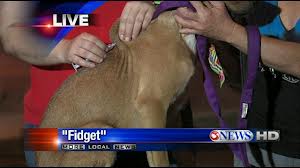
Imagine if your dog or cat got lost. You’d want to give him or her the best chance of getting home. With microchipping, you can.
Even the most responsible pet owners can’t always guarantee their pet won’t get lost. A leash could break or slip out of your hand, a pet could push through a screen door or window, or a contractor or friend might accidentally leave a door or gate open.
Microchipping is a safe, permanent way to identify your pet in case he or she becomes lost. A microchip, which is a tiny device about the size  and shape of a grain of rice, is placed just under the loose skin at the back of the neck. When a lost dog or cat without an ID tag is found, a veterinarian or veterinary technician will use a handheld microchip scanner to check for a chip. If the pet has one, it will transmit its ID number to the scanner via a low-frequency radio wave. The veterinary hospital or shelter then calls the chip manufacturer, retrieves the pet owner’s contact information, and calls the owner.
and shape of a grain of rice, is placed just under the loose skin at the back of the neck. When a lost dog or cat without an ID tag is found, a veterinarian or veterinary technician will use a handheld microchip scanner to check for a chip. If the pet has one, it will transmit its ID number to the scanner via a low-frequency radio wave. The veterinary hospital or shelter then calls the chip manufacturer, retrieves the pet owner’s contact information, and calls the owner.
We recommend that you use a microchip, along with a collar and ID tag, to identify your pet. An ID tag is still a reliable identification method. Pets that have tags with current contact information are more likely to not end up in shelters and tend to get home faster than those without tags. However, collars and ID tags aren’t permanent and can be removed (overnight or for grooming); pets can also lose them. With a microchip, your pet will have a much better chance of being identified and returned to you. Pets without microchips that end up in shelters may be adopted out to another family or even euthanized.
Although we hope your pet never becomes lost, we want you to be prepared. We can also suggest a plan to have in place so if your pet does go missing, you’ll be able to act quickly. With your registration of your microchip you have access to many additional features such a the “lost pet network”, instant access to printable flyers, travel insurance should your pet be found more than 500 miles away, emergency medical insurance and access to the ASPCA poison control hotline (normally a $65 consultation fee) in any emergency. See the HOMEAGAIN site for additional details and found pet success stories.
We can microchip ferrets, rabbits, birds, horses, goats, alpaca, llamas, etc. Almost all species can by microchipped! For large animals, this can prevent theft and misidentification of animals and is often simpler than tattooing or branding. Please contact us to schedule an appointment to microchip your pet.


